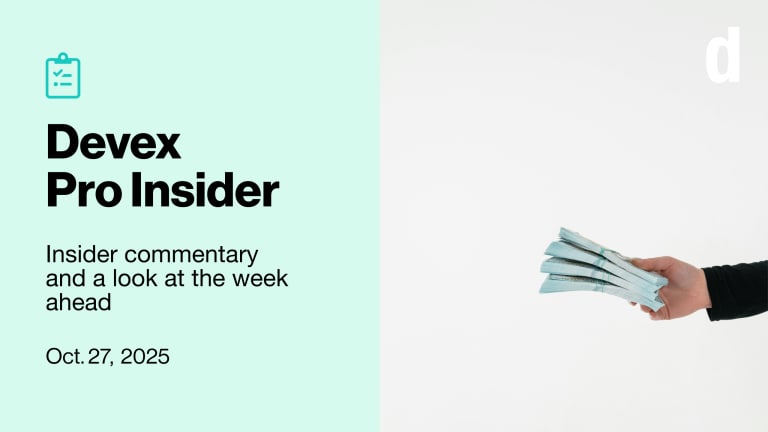Philanthropy sector split over bill to restrict donor-advised funds

Critics of a U.S. congressional bill that would place new restrictions on donor-advised funds, or DAFs, said this week that the legislation is a misguided attempt to address income inequality.
However, supporters of the measure say that it is a necessary overhaul of a tax loophole allowing money that would otherwise flow to working charities to sit in DAFs indefinitely.
U.S. Sens. Chuck Grassley, a Republican from Iowa, and Angus King, an independent from Maine, recently introduced a bill that would create new deadlines for funders to spend money held in DAFs, which have become a popular grant-making vehicle among the wealthy. The bill, known as the Accelerating Charitable Efforts Act, has so far failed to gain traction in the Senate. Although an aide from King’s office told Devex that the senators were “pursuing all ways of advancing this legislation.”
Current United States law provides DAF holders with an immediate tax break when they set up the account but does not impose deadlines for the money to be paid out — meaning the money could remain there in perpetuity.
An estimated $142 billion could flow to those charities if the proposed restrictions are enacted. International groups such as Global Citizen have said that distributing more money from DAFs could hasten progress on achieving Sustainable Development Goals for low-income countries by 2030.
US bill to accelerate donor-advised funds could have global impact
A bill introduced in the U.S. Senate that would establish deadlines for donor-advised funds to distribute money to charities has divided the philanthropy sector.
The bill is a necessary tool to address the inequalities in the U.S. tax system that have allowed the wealthiest Americans — such as Amazon founder Jeff Bezos and Facebook co-founder Mark Zuckerberg — to “plop their money into vehicles that never have to spend a single penny for the public good,” Ray Madoff, a professor at Boston College Law School, said during a briefing Thursday hosted by the Chronicle of Philanthropy.
Madoff has been leading efforts to restrict the use of DAFs. She is a member of the Initiative to Accelerate Charitable Giving — a coalition of academics, individual donors, and philanthropies — and though it doesn’t endorse legislation, a spokesperson told Devex that IACG is “pleased” that the bill “restores the connection between charitable tax benefits and benefits to charities.”
However, the Council on Foundations, a trade association representing philanthropies, opposes the bill and has said that instead of accelerating charitable giving, it could turn off funders who are not obligated to give to charities.
“You can’t reduce wealth inequality by making charitable giving more difficult,” COF President and CEO Kathleen Enright said during the briefing.
Steve Taylor, United Way’s senior vice president and counsel for public policy, also said that opposition from within the nonprofit sector was stalling the bill, making it unlikely that it would clear Congress and be signed by President Joe Biden.
“I could say that based on my 25 years of experience in doing government relations and working on Capitol Hill, this is not a bill that is even going to see the light of day in the judiciary and the finance committee, much less on the Senate floor,” he said.
“[I]n my work as a philanthropic adviser, I don’t get the sense that this will inhibit giving at all, and especially from the ultrahigh net wealth set.”
— Stephanie Ellis-Smith, co-founder, Give BlckHe suggested the charities lobbying around the bill were spending limited advocacy capital with Congress that might be better used to advocate on other issues, such as policy changes on charitable deductions.
However, Stephanie Ellis-Smith, a philanthropy adviser and co-founder of Give Blck, which helps connect donors to Black nonprofits, said that while throwing billionaires into the mix may have skewed the conversations around proposed DAF regulations, the changes being pushed would ultimately benefit the kinds of high net worth clients that she advises who are looking for ways to be more intentional about charitable planning.
“[I]n my work as a philanthropic adviser, I don’t get the sense that this will inhibit giving at all, and especially from the ultrahigh net wealth set,” she said. “The everyday givers are already giving at a larger percentage than the very wealthy anyway, and they tend to be the least motivated by tax,” she said.
Among other measures included in the bill are incentives for private foundations to increase their annual payouts from the minimum 5% required by federal law to 7%, as well as restrictions on how they meet payout requirements.
Madoff said during the briefing that there has been a significant change in how much money flows directly to working charities over the past 30 years. Currently, at least 13% of individual charitable giving goes to DAFs, and another 15% is going to private foundations. That’s a departure from three decades ago when 95% of individual charitable giving went outright to working charities and only 5% went to private foundations and DAFs, she said.
Update, Sept. 14, 2021: This article has been updated to clarify comments from Stephanie Ellis-Smith on “everyday givers” and add remarks from the Initiative to Accelerate Charitable Giving on the U.S. congressional bill.
Search for articles
Most Read
- 1
- 2
- 3
- 4
- 5






